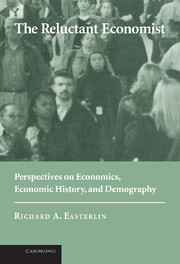Book contents
1 - The Reluctant Economist
Published online by Cambridge University Press: 03 December 2009
Summary
At the start, I was not a reluctant economist. In the beginning, economics opened up a new and exciting world. The Keynesian Revolution was in full swing, and, like other graduate students, I was caught up in it. The message of the revolution was new and straightforward: major depressions and staggering unemployment were not an inevitable evil of industrialization. Societies had the power, through public policy, to prevent and correct serious depressions.
Today, disillusionment with this message prevails among economists. But it is not the supposed failures of the Keynesian Revolution that have made me into a reluctant economist. As a teacher of introductory macroeconomics, I am still more Keynesian than many of my colleagues. Rather, my reluctance stems at bottom from a research philosophy forged at the hands of my mentor, Simon Kuznets, the third Nobel laureate in economics. In a field in which theory was and is the be-all and end-all of intellectual accomplishment, Kuznets taught that the touchstone of achievement is insight into empirical reality. Moreover, other social sciences might, along with economic theory, contribute to one's understanding. But it was some years before firsthand experience was to make me a true believer in this philosophy.
STUMBLING INTO ECONOMICS
Most young people today have a good idea of their prospective work, for only about 6 percent of high school seniors respond “don't know” when asked about the kind of work they think they will be doing at age 30 (Bachman, Johnston, and O'Malley 1988).
- Type
- Chapter
- Information
- The Reluctant EconomistPerspectives on Economics, Economic History, and Demography, pp. 3 - 20Publisher: Cambridge University PressPrint publication year: 2004



